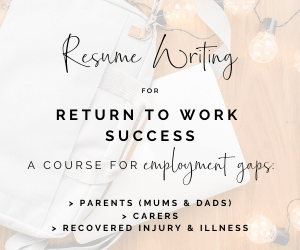Studying anything with success is time consuming. It is especially difficult if you have other commitments like working or raising kids. Making the decision to study after having children can be tough, more so if they are young, but it can also be very rewarding.
There are many benefits to returning to study once you’ve had a baby. Maternity leave can be a great time to gain more qualifications to get a promotion, higher paying job, or change careers completely. But figuring out how to study after having children, when you’re dealing with day to day life and the demands of young children takes prioritisation, commitment and great planning.
For many women, our career development can sometimes take a backseat to our family’s or spouse’s needs. For some though, there is still a burning desire to progress which, despite being pushed aside at times, is hard to ignore for long. But between balancing an already full plate, how can this possibly happen? Before you try and figure out strategies to suppress that career progression desire, consider how you can make studying after children possible.
Studying After Having a Baby
I started studying before having my first child and finished my degree after having my second. I did exams while 38 weeks pregnant and assignments while surviving on no sleep and breastfeeding. It’s hard but very possible to study after having children, and there are many tips to help you along the way.
Tip 1: Consider online education
Universities and other institutions are beginning to recognise that in our jam packed lives, enrolling in traditional courses that requires attending lectures at any given time is not always possible. No matter how strong the driving factors are. This revelation has resulted in a spike in online education offerings, not just from small players offering ambiguous courses, but from some of the most prestigious universities in Australia who now offer some courses that are highly in demand.
Not every course lends itself to online study, but you will find that there are now hundreds of courses available that do. This gives you options, such as watching lectures after the kids are in bed instead of having to find the time in your day to attend them in person. Studying online provides the flexibility needed to make further education accessible to so many more people, and saves you from needing to organise childcare in order to attend classes.
Tip 2: Go part time
When you decide to start your study journey really think about how many hours you can commit to your course. Most universities suggest it will take 10 hours of study per week to complete each subject you undertake and a full time load is usually 4 subjects per semester. This can equate to a lot of time needed to put into your study and partnering that with work or a busy family life can be too much.
Consider going part time. This may involve only studying 1 or 2 subjects per semester but might be the difference between having time to complete those successfully and struggling through only just coping. For a lot of busy mums, although it means taking longer to complete your course, doing it part time is a more practical solution.
Tip 3: Plan and schedule
Get a diary, calendar or app and organise everything. Studying with children takes a lot of planning. Put down when you can fit in study and when all your assignments are due. Most courses will tell you at the start of a subject when all your assessments and due dates are. Add in any family activities or events that you know about.
Planning allows you to know when things can get done and what is coming up. Put it somewhere you’ll look at often so that you know what you need to be doing and when. Also make sure your partner has a copy, so they’ll know when you have assignments due and may need a bit more time to study.
Tip 4: Be disciplined
Procrastination is a killer. There will be a million legitimate reasons to put off studying to a bit later, sick kids, crying babies etc, so you must resist the temptation to put off studying unless really necessary. When you have the opportunity to do work you need to be disciplined enough to take it. It doesn’t matter if you can only get in 30 minutes at a time, you never know what tomorrow will bring so take the change when you can.
Being disciplined is especially important if you are doing online courses as you don’t have a schedule to keep like you do if you are attending classes. Ensure you’re making time to study and stick to it. To study successfully you need to make room for it in your life, don’t just try and fit it in when you can.

Tip 5: Do everything the course suggests
The course load for a subject can seem like a lot. They will generally expect you to do a lot of reading and self-study, even if you’re not doing your course online. Try and get as much of it done as you can – there’s usually a reason it’s included. You don’t want to get to a couple of weeks before your exam trying to fit in a whole semester’s worth of work, so make sure you are doing the work consistently through the course.
Tip 6: TV is ok sometimes
Not for you, but your kids. There are times when you’re going to have to buckle down and just get stuff done. You might have an assignment due or an exam coming up. You may need to find ways to get the kids to entertain themselves. And if you have an assignment due tomorrow that you need to get done then putting them in front of the TV to watch a movie or some shows is not going to be the end of the world. If you’re feeling guilty then make a deal with yourself that when your assignment is due or your exam is over that you’ll spend some quality time doing something with the kids.
Tip 7: Ask for help if you need it
Don’t be afraid to ask for help and advice. If you need help with the coursework or don’t understand something, ask you teacher or lecturer. It is their job to make sure you understand what you are learning and most are happy to take the time to help out. If you need help at home, rely on your support network. Ask friends or family to take the kids for a couple of hours so you can get stuff done.
This is also where your partner (if you have one) needs to step up.
Tip 8: Schedule some me time
Studying takes time and energy. So does being a mum to any amount of children. And having a partner. If you’re working as well then that’s more. Any combination of those factors is one hell of a mental load. Make sure you’re scheduling in some time out for yourself to recharge. It could be exercise, relaxation or just something you enjoy doing. You’ll definitely thank yourself for it later.
Tip 9: Remember why you’re doing this
Studying can at times be very tedious. There will are also be times when you are trying to get everything done, get overwhelmed and think “why am I doing this”? You need to remember the big picture and why you are studying. Are you trying to change careers? Get a better paying job? Extend your opportunities? Think about what you are trying to achieve.
It’s also good to have small goals. If you’re doing a course part time, it can seem like a very long time before you are going to be finished. Take it week by week and focus on the next goal. Celebrate milestones, such as finishing each assignment. And remember you are being a role model to your kids, showing how hard work can achieve something you want.
Studying after having kids is can be tricky. There are a lot of balls to juggle and many unexpected things show up. But with some organisation and planning it can be achievable to do that course you want and do it successfully.

The Benefits of Short Courses
Short courses are practical, convenient and can really ramp up that resume. For those of us for whom our university degrees are getting a little dated, who never went to Uni and jumped straight into the workforce, or who have taken a career break thanks to having children, short courses are ideal for brushing up on skills.
While obviously not as solid as a degree, short courses keep the mind sharp and active, and open up new windows and opportunity when it comes to thinking about your career. They show potential employers you are motivated, keen to learn and sharp. They also show current employers you are not content to rest on your laurels, and that you see continual improvement as a priority.
Short courses are also convenient for those who simply don’t have the time, or the inclination, to commit to a longer degree. They often offer the option to learn by correspondence, online learning or require just one evening or afternoon a week. Aside from the career advantages short courses can offer, they are also perfect for people who are at home: carers, stay-at-home parents and even retirees can really benefit from short courses in a range of ways.
Keeping the mind active is just as important as keeping the body active and learning new things. Testing yourself, can be so rewarding for those who might feel bogged down in their day to day obligations. Those who have completed short courses to brush up their skills at work show self-discipline, drive and the desire to do well. Those who have completed short courses in fields unrelated to their careers show an open and interested mind, an enthusiastic attitude and a lust for life.
What employer wouldn’t want these attributes in their employees?
Short courses can also benefit those who work for themselves and are self employed. Working every day on the same tasks, small business owners run the risk of their ideas getting tired, their minds uninspired. A short course, which may offer new ideas and skills, can really fire up the mind and inspire greater business success.
If you’re thinking about studying, take a look at the Work At Home Mums Education and Courses Directory to get you started.






